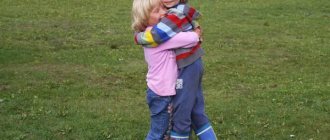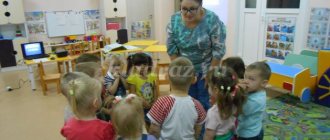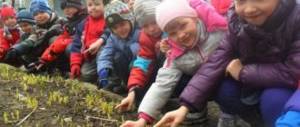Interaction of the kindergarten with the family in accordance with the Federal State Educational Standard for Education
Interaction of the kindergarten with the family in accordance with the Federal State Educational Standard for Education
For the comprehensive development of a child’s personality, interaction
two important institutions for the socialization of children -
family and kindergarten
.
The federal state educational standard for preschool education specifies requirements for the interaction of preschool educational institutions with parents
. If earlier teachers limited themselves to educating parents, now, as Art. 44 of the Federal Law, “parents have a priority right to the education and upbringing of children over all other persons. They are obliged to lay the foundations for the physical, moral and intellectual development of the child’s personality.”
To date, within the framework of the implementation of the Federal State Educational Standard
There is only one way out for preschool teachers in this area of work: including parents in the targeted education of their children on a par with
kindergarten
and changing the value attitude of
kindergarten staff towards the family
.
The goal of teachers is to create a unified space for child development in the family and preschool educational institutions
, to make parents participants in a full-fledged educational process.
Achieving high quality in development, fully satisfying the interests of parents and children, and creating this unified space is possible through systematic interaction between the preschool educational institution and the family
. Success in this difficult process of raising a full-fledged person depends on the level of professional competence of teachers and the pedagogical culture of parents.
Providing psychological and pedagogical support for families
and increasing the competence of parents
(legal representatives)
in matters of development and education, protection and promotion of children’s health is one of the main tasks
of the Federal State Educational Standard for Education
.
In this regard, in order to create a “ family-kindergarten ”
, there is a need to take a different look at the problem of
interaction between preschool educational institutions and parents
.
In accordance with the Federal State Educational Standard, preschool educational institutions are obliged
:
• inform parents (legal representatives)
and the public regarding the goals of preschool education, common to the entire educational space of the Russian Federation, as well as about the Program, and not only to
the family
, but to all interested parties involved in educational activities;
• ensure openness of preschool education;
• create conditions for the participation of parents (legal representatives)
in educational activities;
• support parents (legal representatives)
in raising children, protecting and strengthening their health;
• ensure the involvement of families directly in educational activities, including through the creation of educational projects together with the family
based on identifying needs and supporting
family
;
• create conditions for adults to search for and use materials that ensure the implementation of the Program, including in the information environment, as well as for discussion with parents (legal representatives)
children issues related to the implementation of the Program.
Kindergarten task
:
• involve family
on your side in terms of unified approaches to raising a child, to provide her with pedagogical assistance;
• take into account a differentiated approach to each family
, take into account the social status and microclimate
of the family
, as well as parental needs and the degree of interest of parents in raising their children;
• create a unified space for child development in the family and preschool educational institutions
, to make parents participants in a full-fledged educational process.
Tasks of teachers: provide psychological and pedagogical support to the family
, increase the competence of parents, establish partnerships with
the family
of each pupil, create an atmosphere
of mutual understanding
, common interests, and emotional
mutual support between the preschool educational institution and the family
.
The goals and objectives of the family and kindergarten coincide
, both parties wish to receive the same result at the end of
kindergarten
: a healthy, smart, proactive and morally adequate child who can successfully continue his education at school.
The main directions of work with parents in the context of the implementation of the Federal State Educational Standard for Education
:
Cognitive direction - aimed at familiarizing parents with the age and psychological characteristics of preschool children, developing practical skills in raising children in parents.
This area includes: general and group meetings, consultations, seminars, individual conversations. Exhibitions of children's works and crafts
, made together with parents. Participation of parents in the preparation and conduct of holidays, entertainment, and leisure activities. Joint excursions, walks, hikes. Open classes, master classes, joint creation of a subject-development environment.
Open screenings give parents a lot: they get the opportunity to see their child in a situation different from the family one. Compare his behavior and skills with the behavior and skills of other children, adopt teaching methods and educational influences from the teacher.
Information and analytical direction - aimed at identifying the interests, needs, requests of parents, the level of their pedagogical literacy, establishing emotional contact between teachers, parents and children. Helps to better navigate the pedagogical needs of each family
and take into account individual characteristics, allows you to properly structure work with parents and make it effective.
It is necessary to start with an analysis of the social composition of parents, their mood and expectations from the child’s stay in kindergarten
.
In this area, you can conduct: surveys, testing, personal conversations. All materials for review must be aesthetically designed so as to attract the attention of parents (text on colored paper, photographs of children in the group, symbol pictures)
. The content of the proposed material should be truly interesting to the majority of parents; it must be regularly updated, otherwise parental interest in this information will quickly disappear.
Leisure activities are the most attractive, popular, and useful areas. It is designed to establish warm, trusting relationships, emotional contact between teachers and parents, between parents and children. Holidays should be held not for parents, but with the involvement of parents, so that they know how much trouble and work must be put into preparing any celebration. Meetings with parents at festive events always mobilize, make our everyday lives brighter, this increases our self-esteem as a teacher, parents gain satisfaction from working together and, accordingly, the authority of the kindergarten grows
.
In this area you can organize: holidays, entertainment, birthday celebrations, exhibitions, competitions for traditional holidays, days of good deeds and much more.
Organizing interaction with family is difficult work
, which does not have ready-made technologies and recipes.
Its success is determined by the intuition, initiative and patience of the teacher, his ability to become a professional assistant in the family
.
The practical material outlined above from work experience is necessary for two systems ( kindergarten and family )
became open to each other and helped to reveal the child’s abilities and capabilities.
And if the work with parents described above and its analysis are carried out in the system and not “on paper”
, then it will gradually give certain results: parents from
“spectators”
and
“observers”
will become active participants in meetings and assistants to the teacher, thereby creating an atmosphere
of mutual respect
. And the position of the parents
as educators will become more flexible, since they have become direct participants in the educational process of their children, feeling more competent in raising children.



